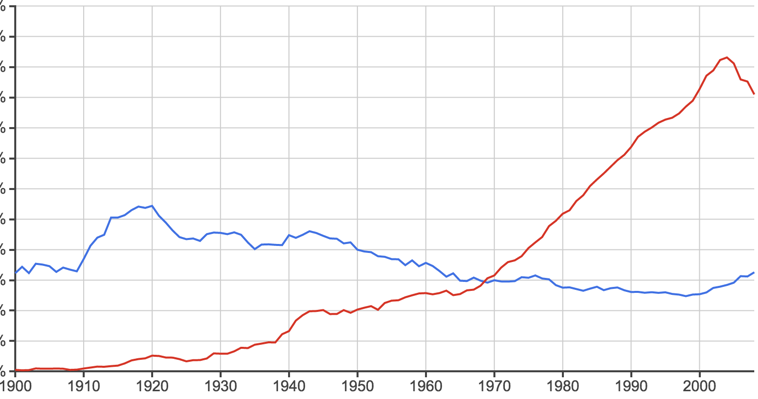Archive for December, 2015
December 10, 2015 @ 2:21 pm· Filed by Victor Mair under Borrowing, Signs, Topolects, Writing
Ryan Kilpatrick has an interesting article in Hong Kong Free Press:
"Taiwan city promises to ‘correct’ simplified road sign after public outcry" (12/7/15)
It includes this photograph, which illustrates some of the problems:

Read the rest of this entry »
Permalink
December 10, 2015 @ 2:11 pm· Filed by Victor Mair under Translation
Don Clarke spotted this suspiciously named dish at the Diàoyútái dà jiǔdiàn 钓鱼台大酒店 (Diaoyutai Hotel) in Beijing on 12/9/15:

Read the rest of this entry »
Permalink
December 10, 2015 @ 3:28 am· Filed by Mark Liberman under Computational linguistics, Linguistic history
Dyami Hayes writes to point out that there has been a change over the past century in the relative popularity (at least in printed text) of constructions like these:
What this book sets out to do is to provide some tools, ideas and suggestions for tackling non-verbal reasoning questions.
What it attempts to do is provide a framework for understanding how local governments are organized.
The Google Books ngram plots for provide, look, tell, and say show similar patterns — or summed for those four verbs (with the to do is VERB version in red and the to do is to VERB version in blue):

Read the rest of this entry »
Permalink
December 9, 2015 @ 6:24 pm· Filed by Mark Liberman under Announcements
Appearing in The Paris Review, Winter 2015:
From “A New English Grammar”
Jeff Dolven
*The Haystack’s Painting
The haystack’s painting hangs in the Met;
the painting of the haystack, that is,
the one by Monet, not by van Gogh,
the rose-blue, snow-lit one with the haystack
in it. The haystack has this deal
with many painters, also Millet,
appearing not for a fee, nor a stake,
exactly, but for the sovereign right
to have your eyes back whenever it wants.
*By convention, an asterisk indicates an instance of improper usage. All titles are drawn from such examples of bad grammar in Rodney Huddleston and Geoffrey K. Pullum, The Cambridge Grammar of the English Language (Cambridge: Cambridge University Press, 2002).
Read the rest of this entry »
Permalink
December 9, 2015 @ 12:59 pm· Filed by Mark Liberman under Computational linguistics
Yesterday I explained why the long-tailed ("Zipf's Law") distribution of word frequencies makes it almost impossible to estimate vocabulary size by counting word types in samples of writing or speaking ("Why estimating vocabulary size by counting words is (nearly) impossible"). In a comment on that post, "flow" suggested that similar problems might afflict attempts to estimate vocabulary size by checking someone's knowledge of random samples from a dictionary.
But in fact this worry is groundless. There are many problems with the method — especially defining the list to sample from, and defining what counts as "knowing" an item in the sample — but the nature of word-frequency distributions is not one of them.
Read the rest of this entry »
Permalink
December 9, 2015 @ 8:58 am· Filed by Victor Mair under Language and politics, Transcription
After Tim Friese's comment at the end of our last post on Daesh, I almost didn't want to think about the word again, much less write about it. But then I came across this article by Matthew Weaver in The Guardian:
"Syria debate: the linguistic battle over what to call Islamic State. David Cameron has started calling the group Daesh – a name based on a derogatory Arabic acronym – leading to heated exchanges among MPs" (12/2/15)
Read the rest of this entry »
Permalink
December 9, 2015 @ 8:09 am· Filed by Mark Liberman under Crash blossoms
Sue-lin Wong, "China Nov inflation edges up, but deflation risks dog economy", Reuters 12/9/2015. When I saw that headline, I wondered whether dog economy was a Chinese idiom for "recession". Or could the story really be about the economic sector dealing with dogs?
Of course what's really going on is that risks is a plural noun and dog is a verb, meaning "to bother or pester persistently".
But there really is a dog economy, even if Chinese deflation isn't risking it: Teresa Bradley and Ritchie King, "The Dog Economy Is Global—but What Is the World's True Canine Capital?", The Atlantic 11/13/2015.
Read the rest of this entry »
Permalink
December 8, 2015 @ 10:37 pm· Filed by Victor Mair under Language on the internets, Parsing
During the past week, this phrase kept popping up on the Chinese internet, on WeChat, on blogs and microblogs — it was just everywhere (1,850,000 ghits), and people were wondering exactly what it meant:
zhǔ yào kàn qì zhí 主要看气质 ("main / primary — want — see — gas / breath / spirit / vital energy — quality / substance / nature")
I have intentionally not aggregated the syllables into words. The lack of a disambiguating context for this phrase — it tended to just show up by itself — permitted several different readings.
Read the rest of this entry »
Permalink
December 8, 2015 @ 3:31 pm· Filed by Mark Liberman under Computational linguistics
A few days ago, I expressed skepticism about a claim that "the human lexicon has a de facto storage limit of 8,000 lexical items", which was apparently derived from counting word types in various sorts of texts ("Lexical limits?", 12/5/2015). There are many difficult questions here about what we mean by "word", and what it means to be "in" the lexicon of an individual or a language — though I don't see how you could answer those questions so as to come up with a number as low as 8,000. But today I'd like to focus on some of the reasons that even after settling the "what is a word" questions, it's nearly hopeless to try to establish an upper bound by counting "word" types in text.
Read the rest of this entry »
Permalink
December 7, 2015 @ 4:58 pm· Filed by Geoffrey K. Pullum under Dialects, Language and politics, Language and religion, Language and the media, Slogans
You ain't no Muslim, bruv! The phrase already gets more than 650,000 hits on Google in the UK, and the hashtag #YouAintNoMuslimBruv gets about 1,670,000. It is becoming a mantra, a talismanic incantation for conjuring up goodwill in a world where more and more attempts are being made to foment hatred between Muslims and everyone else.
Read the rest of this entry »
Permalink
December 7, 2015 @ 12:20 am· Filed by Victor Mair under Spelling, Writing systems
Yesterday afternoon, Liwei Jiao went to a Chinese restaurant in South Philadelphia and ordered three dim sum dishes. Below is a photograph of the order taken down by the waitperson. The restaurant is called Wokano and it is located at 12th St and Washington Ave.

(Click to embiggen.)
Read the rest of this entry »
Permalink
December 6, 2015 @ 11:48 pm· Filed by Victor Mair under Errors, Writing systems
Just a few days ago we had this colossal blunder being trumpeted all over China:
Xí Jìnpíng huìjiàn Měiguó zǒngtǒng Àomǎbā 习近平会见美国总统奥马巴 ("Xi Jinping meets American President Omaba")
See "Xi Jinping meets President Omaba in Paris" (12/4/15)
Now Al Jazeera (12/6/15) reports another lollapalooza of a typo in China. This time the tables were turned on their own president:
"China suspends reporters over Xi 'resigns' typo: Two reporters and two editors punished for accidentally replacing 'zhici' with 'cizhi' in article on Xi's speech."
Read the rest of this entry »
Permalink
December 5, 2015 @ 4:35 pm· Filed by Mark Liberman under Language and politics, Rhetoric
Today the New York Times presented two dissections of the style as well as the content of Donald Trump's rhetoric: Patrick Healy and Maggie Haberman, "95,000 Words, Many of Them Ominous, From Donald Trump’s Tongue", and Jeremy B. Merrill, "How Donald Trump Talks".
But I haven't seen anyone describe what seems to me to be the most striking aspect of his style: its repetitiveness.
Read the rest of this entry »
Permalink



